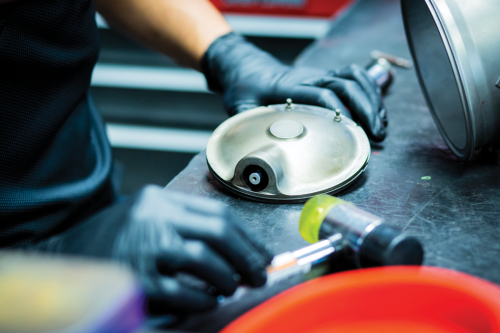What are MRO Services?

MRO services, standing for Maintenance, Repair, and Overhaul, encompass a wide range of activities designed to inspect, maintain, and restore aircraft to optimal conditions.
The term MRO services is one often used within the aviation industry representing a collection of tasks and processes that ensure the safety, efficiency, and airworthiness of an aircraft. As aircraft take to the skies, they are subjected to a large variety of operational stressors and environmental factors that can impact their performance and structural integrity over time. MRO services, standing for Maintenance, Repair, and Overhaul, encompass a wide range of activities designed to inspect, maintain, and restore aircraft to optimal conditions. These services are most commonly performed on airframes and engines due to the significant damage they are subject to. Without effective MRO practices, aircraft are put at risk for potential safety hazards and disruptions in flight schedules. Airlines schedule frequent MRO visits due to these risks as the last thing they want to be known for is having unsafe or inconvenient flying conditions. MRO service technicians help prevent these problems by identifying and fixing potentially serious operational issues before the aircraft takes flight. Regular MRO of an aircraft helps ensure that its operational lifespan can be maximized. Regarding the 3 letters in the MRO acronym, each represents a different type of service.
Maintenance: At the core of MRO services lies maintenance, the proactive efforts taken to keep an aircraft in top-notch shape. This type of operation is similar to the routine checkups we perform for our vehicles. Just as regular oil changes, tire rotations, and inspections are essential to keep a car running smoothly, maintenance in aviation involves systematically examining various components of an aircraft to ensure they function as intended. Maintenance tasks range from examining the airframe's structural integrity to evaluating the condition of critical systems, such as hydraulics, fuel, and electrical systems. These routine tasks are essential for preventing potential issues and maintaining the aircraft reliability.
Repair: Despite the best efforts in maintenance, mechanical and/or structural malfunctions can and will occur during an aircraft's operational life. This is where the "R" in MRO services, “repair”, comes into play. Repairs address the various issues that arise during an airplane’s operation and restore it back to an optimal state. These issues can range from minor glitches in avionics systems to more significant challenges, such as engine component failures. The repair phase requires quick and precise actions to identify the root causes of the problems and implement effective solutions.
Overhaul: Overhauls, which are typically scheduled after a designated period of flight operations, are a vital aspect of MRO services. This process involves the aircraft getting taken apart, piece by piece, for in-depth inspections. Every component is scrutinized for potential damage and deviations from original manufacturer specifications. Components not meeting standards are replaced to restore structural integrity and performance. Overhauls are not only essential for addressing known issues but also for uncovering hidden problems that could compromise the aircraft airworthiness if left undetected.
Not all MRO service stations are the same, and there are many different types of facilities and organizations where MRO services are performed, to varying degrees. All of these repair stations require certification from the FAA and can only perform services on aircraft and components that they’ve been certified to work on. One example of an MRO station is a Commercial Airline Hub which is a facility equipped to provide a wide range of MRO services, from routine checks and minor repairs to major overhauls and modifications. These stations are typically located at the airline’s major hub and are owned and operated by the airline themselves. Outside of airlines, Independent Repair Stations are the most common form of MRO. These stations are not owned by airlines but are separate entities that can be contracted by various airlines or aircraft operators to perform maintenance work on their aircraft and components. Independent repair stations often offer specific expertise in particular areas such as avionics, engine maintenance, or structural repairs. FBOs or Fixed Base Operators are also big in the industry. These businesses are typically based at smaller regional airports serving mainly general aviation aircraft rather than airlines. FBOs provide various aeronautical services such as refueling, parking and minor repairs.
MRO solutions are one of the three main services Jet Parts Engineering provides for its customers (along with PMA Parts and DER Repairs). Northeast Aero Compressor or NEACO, which was acquired by Jet Parts Engineering in 2022, is the independent repair station branch of JPE that performs MRO services. NEACO was the first non-OEM repair station in the world to engineer and build dedicated test facilities for the Boeing 777 Air Cycle Machine and Air Driven Unit. They possess extensive MRO capabilities including pneumatics, hydraulics, electro-mechanical and fuel. NEACO has over 30 years of service experience and has Unlimited Accessory Class 1 and 2 ratings as well as a Class 3 accessory rating. The definitions of each class are as follows:
Class 1: A mechanical accessory that depends on friction, hydraulics, mechanical linkage, or pneumatic pressure for operation, including aircraft wheel brakes, mechanically driven pumps, carburetors, aircraft wheel assemblies, shock absorber struts and hydraulic servo units.
Class 2: An electrical accessory that depends on electrical energy for its operation, and a generator, including starters, voltage regulators, electric motors, electrically driven fuel pumps, magnetos, or similar electrical accessories.
Class 3: An electronic accessory that depends on the use of an electron tube transistor, or similar device, including supercharger, temperature, air conditioning controls, or similar electronic controls.
These ratings highlight NEACO’s diverse capability offering and consistent quality in serving advanced aircraft accessories. NEACO additionally prides itself on its commitment to customer satisfaction. They offer timely and cost-effective MRO solutions and are always looking for ways to evolve their services and capabilities, ensuring they remain at the forefront of the industry.
